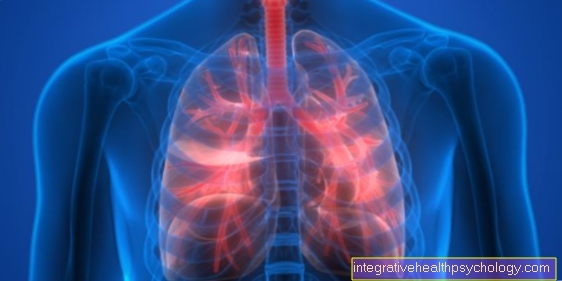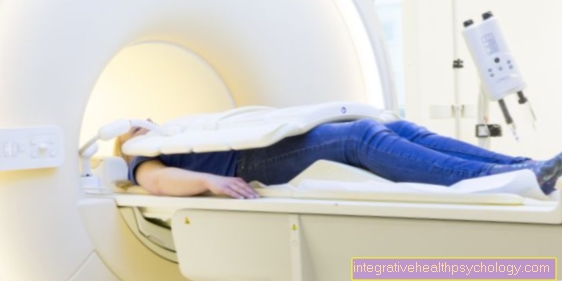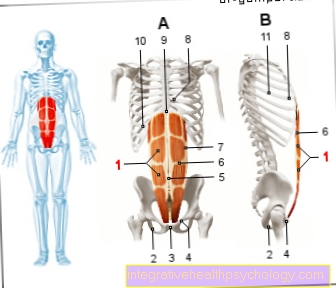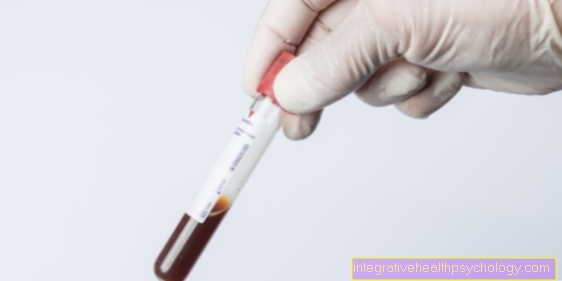Heartburn during pregnancy
introduction
For many women, pregnancy is a wonderful experience that they enjoy to the fullest. Other women, on the other hand, struggle with a variety of ailments during pregnancy. These include nausea and vomiting, constipation (Constipation) and heartburn. Heartburn in pregnancy is particularly uncomfortable.
Heartburn describes the pain in the sternum area and in the throat area that occurs when acidic stomach contents flow back. Under normal circumstances, heartburn triggers are stress, fatty foods, alcohol, or caffeine.
During pregnancy, the release of the hormone progesterone is primarily responsible for the development of heartburn. Progesterone "loosens" the ring-shaped sphincter that forms the border between the stomach and esophagus and actually prevents the backflow of acidic stomach contents. If the sphincter is relaxed, this reflux becomes possible, which results in burning pain in the entire esophagus and stomach.
General information on the topic can be found at: heartburn

What helps against heartburn during pregnancy?
Heartburn during pregnancy is very stressful for many patients, luckily there are some simple therapy options available.
Pay attention to the diet
Heartburn during pregnancy can often be prevented with slight changes in everyday life. The most important pillar here is probably the change in diet. Pregnant women with heartburn should avoid very large, spicy, and fatty meals. It is better to have several small meals that are easy to digest.
Highly acidic foods such as Fruit juices, fruit teas, or vinegar salad dressings also promote heartburn and should be avoided. Many patients also find it helpful to regularly consume yogurt products or ginger, for example as tea. It is also important to drink enough water, at least 1.5-2 liters of water are recommended daily.
Change body position
If the heartburn occurs mainly when lying down, it can help to elevate the upper body or to turn on the left side, as this relieves the stomach. Care should also be taken to ensure that the clothing is not too tight and thus also increases the pressure on the stomach.
Alternative methods and drugs
Homeopathic remedies such as Robinia pseudacacia or alternative medicine procedures such as acupressure help many pregnant women with heartburn.
If these home remedies and lifestyle changes do not help, there is also the option of taking heartburn medication during pregnancy. Here there are the acutely effective drugs of the group of antacids, which can bind excess stomach acid. Alternatively, so-called proton pump inhibitors can reduce gastric acid production.
Under no circumstances should you take a medication on your own, but rather consult your gynecologist or a pharmacist to ensure that this medication cannot harm your child.
Fight the causes
Above all, combating the causes helps against heartburn. Of course, you cannot treat the rising progesterone level in heartburn during pregnancy, because the hormone is extremely important for maintaining the pregnancy (progesterone is also called the "pregnancy protection hormone").
Nonetheless, one can observe when exactly the heartburn occurs. If this is the case after eating fatty foods, for example, you should try to change your diet to include less fatty foods. As mentioned above, one must also pay attention to the acidity of the various foods. Fruit, for example, contains hardly any fat, but a lot of natural acid. This acid can also have a positive effect on the development of heartburn.
If heartburn occurs after consuming caffeine, you should switch from coffee to tea. This not only counteracts heartburn, but is also better for the unborn child. Caffeine in moderation is allowed during pregnancy, but the pregnant woman should rather use water and tea.
If heartburn is caused by stress or stressful situations, it is advisable to avoid these situations and reduce the stress. Here can help:
- yoga
- autogenic training
- Relaxation exercises
Methods of naturopathy like acupuncture or Acupressure relaxing effects are also said to be.
Read more on this topic at: Heartburn - What To Do?
Medication for heartburn during pregnancy
Heartburn during pregnancy means a lot of suffering for some women, as the pain is often almost unbearable. If avoiding certain foods and caffeine does not help, there is an option to treat heartburn with medication.
However, drugs against heartburn should only be taken during an existing pregnancy after careful consultation with the attending physician, as there is still no reliable knowledge as to whether the drugs could harm an unborn child.
There are three different drug groups to choose from, if applicable:
1st group
The first group are the antacids. They are based on the reduction in the acidic environment within the stomach. Antacids are basic drugs that lower the concentration of protons in the stomach. Since protons (positively charged hydrogen atoms) are responsible for the acidity of the stomach, lowering them has a positive effect on the symptoms of heartburn. Antacids are sold in pharmacies as Aludrox® and Maaloxan®.
Read more on this topic at: Heartburn medication
2nd group
The second group of drugs for heartburn are preparations called proton pump inhibitors. Proton pumps are located in the cells of the gastric mucosa and transport protons into the stomach and other electrolytes or ions (e.g. potassium) out. The corresponding active ingredient is called omeprazole. Omeprazole prevents the release of protons from the cells of the stomach wall by interfering with the pumping mechanism responsible for this. Acid-resistant capsule forms are used when administering the drug so that the drug does not work in the stomach, but only in the target cells. Side effects that occur when taking omeprazole are rare because the drug is well tolerated, but dizziness, headaches and, in very rare cases, visual disturbances do occur. It is best to take the drug before a meal. Omeprazole is sold in tablet form, for example as Antra®.
3rd group
The third group of drugs for heartburn are the H2 antihistamines. These drugs also counteract the release of protons by blocking the docking sites for histamine. Histamine, a chemical messenger in the stomach, would normally trigger an increased acidification of the stomach contents and thus further worsen heartburn. Active ingredients such as ranitidine, which is sold as Sostril®, are used here.
In addition to the groups of antacids, proton pump inhibitors and antihistamines, there are also drugs with herbal active ingredients that are more suitable for pregnant women. Alginate is obtained from algae, for example. The active ingredient is difficult to digest and forms a film between the stomach and esophagus, preventing the acidic gastric juice from flowing back. Gaviscon® with alginate is commercially available as chewable tablets or oral suspension.
Rennie
A very well known one Antacid against heartburn, which can also be used during pregnancy, provided that there are no other diseases that restrict use Rennie®. This drug works by changing its active ingredients Calcium carbonate and Magnesium carbonate excess Binding protons. The gastric juice does not become excessively acidic, and symptoms such as pain and frequent belching are alleviated. Side effectsthat can occur when taking Rennie® are for example Allergies or others Hypersensitivity reactions but also nausea and Diarrhea. Rennie® is mostly in the form of Chewable tablets sold.
Home remedies for heartburn during pregnancy
Some pregnant women deliberately refrain from taking medication during pregnancy unless they are absolutely necessary.
Some home remedies also help against heartburn during pregnancy. A home remedy that almost always helps with stomach upsets is drinking tea. Soothing herbs such as chamomile, fennel or anise can help soothe the irritated lining of the stomach and esophagus and thus relieve the burning pain. You can either make the tea yourself with the appropriate herbs from the garden or simply use purchased tea.
In the short term, a sip of milk helps relieve heartburn. However, pregnant women must ensure that the milk is pasteurized. Furthermore, milk is not suitable for the long-term "treatment" of heartburn, as it normally contains too much fat. Another home remedy for heartburn are various vegetable juices. First and foremost, the potato juice should be mentioned here. Potatoes are high in starch, which helps neutralize stomach acid a little. Carrot juice works just as well for some patients with heartburn. Healing clay and herbal preparations for stomach problems can be bought in pharmacies, the pharmacist or family doctor is available to advise pregnant women if they are not sure whether they can safely take the medication.
Read more on this topic at: Home remedies for heartburn
Baking soda
Baking soda is considered a helpful and very old home remedy in the treatment of heartburn. It has to do with the fact that baking soda Acid neutralized. In the case of heartburn, the ingestion of baking soda leads to a relief of the discomfort as the corrosive effect of the acid that causes the pain is alleviated.
Baking soda can be bought at the pharmacy, but many people also use simple baking powder which they dissolve in a little water and then drink slowly. However, one disadvantage of baking soda is that it does Increased gas formation in the gastrointestinal tract and thus can increase the pressure in the stomach. This in turn can lead to unpleasant upper abdominal discomfort.
In general, baking soda can be taken during pregnancy, but it will not recommended. If you have bothersome heartburn, you should first change your diet. If this is not sufficient, the attending physician should be consulted, who can recommend further means to alleviate the symptoms.
How Long Does Heartburn Last During Pregnancy?
Heartburn is most common in pregnancy during the last trimester. This is where the pressure in the abdomen caused by the child growing up is greatest. Heartburn usually stops a few days after giving birth. Then the pressure in the abdomen disappears and the hormone levels slowly drop.
But heartburn is a common symptom even in non-pregnant women. If it persists after pregnancy, an extended diagnosis can be useful and / or drugs can be taken that inhibit gastric acid production and thus cause a significant reduction in heartburn.
How dangerous is heartburn in pregnancy?
Occasional heartburn during pregnancy is in most cases stressful for the patient, but not dangerous for the pregnant woman or the child.
Only if the heartburn persists very often over a long period of time can the stomach acid seriously attack and injure the lining of the esophagus. In these cases, drug therapy is required so that there is no permanent damage to the mucous membrane or bleeding.
Rising stomach acid can also damage the enamel of the teeth.
It is important to note that new heartburn in pregnancy can rarely lead to these complications.A consultation with the treating gynecologist can and should take place.
Heartburn in pregnancy at night
Many pregnant women with heartburn suffer from it especially at night. This is because lying down increases the pressure on the stomach and allows stomach acid to enter the esophagus more easily.
It is helpful to either sleep with the upper body slightly raised or on the left side. A soothing tea can also help. Many patients also report that it is helpful not to go to bed on an empty stomach. A small meal should be eaten at least three hours before going to bed.
If heartburn occurs frequently at night, it can also make sense to only take a corresponding medication in the evening. Please only take a heartburn medicine in consultation with a doctor or pharmacist.
Heartburn and Flatulence During Pregnancy
Heartburn during pregnancy is often accompanied by gas. One of the reasons for this is the changed hormone balance. During pregnancy, the body produces more of the hormone progesterone - this is important for the growth and maturation of the uterus.
One side effect, however, is the relaxation of the muscles of the gastrointestinal tract - this leads to the fact that the sphincter between the stomach and esophagus may no longer hold tight. The result is gastric acid leaking into the esophagus and this leads to heartburn.
On the other hand, digestion slows down as the intestines contract less, which increases the risk of flatulence. The growth in size of the uterus and the child also has a similar effect. The increased pressure in the abdomen also leads to increased gastric acid leakage and hinders digestion.
Heartburn and flatulence during pregnancy are not threatening but are often perceived as very stressful. As a precaution, it is important to ensure that you eat easily digestible, rather small meals. Gas shouldn't be suppressed as it can cause bulging pain.
Warm baths, a walk or drinking fennel and caraway tea are often perceived as helpful. Avoiding foods that tend to bloat like legumes, beans or broccoli can also have a preventative effect.
Heartburn and bloating during pregnancy
If a pregnant woman suffers from heartburn, this can often be accompanied by a feeling of fullness. This is a typical secondary symptom of heartburn. The feeling of fullness is often linked to the child's growth and the associated increased pressure on the gastrointestinal tract. Digestion is also considerably slowed down hormonally, which can also lead to gas and a feeling of fullness.
Here, too, a change in diet to several smaller, easily digestible meals is helpful. Patients are encouraged to move around after the meal, for example to take a walk. Teas such as caraway, fennel or peppermint teas also help with a feeling of fullness.
Causes of Heartburn During Pregnancy
Heartburn is more common during pregnancy than in non-pregnant women. About half of all pregnant women will experience heartburn at least once during pregnancy. There are two hypotheses for the development of heartburn during pregnancy.
On the one hand, the unborn child growing in the uterus causes a slow pressure increase in the lower abdomen. This increase in pressure leads to an increased pressure in the area of the stomach. To separate the stomach from the esophagus, there is a sphincter between the stomach and the esophagus. If there is increased pressure in the abdominal cavity, it closes less tightly. The pregnancy hormones estrogen and progesterone also lead to a less powerful closure of this muscle. Even then, stomach acid can flow back into the esophagus and cause heartburn.
Diet also plays a not insignificant role in the development of heartburn, so the risk of developing heartburn is significantly increased when eating large, fatty or very spicy meals.
General information on the topic can be found here: Causes of heartburn
When does heartburn occur during pregnancy?
Heartburn can theoretically occur right at the beginning of pregnancy. This is felt by women who may have suffered from heartburn from time to time. If the gastric sphincter is “pre-stressed”, even small amounts of progesterone are sufficient to loosen the muscle to such an extent that the symptoms of heartburn are triggered. Heartburn often occurs in connection with rich, fatty food or stress.
More likely, however, is the occurrence of heartburn in the second and third trimester (also: trimester) of pregnancy (4th - 9th month). From this point on, the egg cell no longer produces progesterone, but the placenta to maintain the pregnancy. As the pregnancy progresses, the amount of progesterone released by the placenta increases sharply. The likelihood of heartburn also increases.
Most women do not have heartburn until late in pregnancy, i.e. in the last three months. The weight of the growing child, which can put pressure on the stomach, also contributes to the reflux into the esophagus and the development of heartburn.
What should you avoid in nutrition?
The occurrence of heartburn often has a lot to do with diet. This also means that a change in diet can often bring about significant relief from the symptoms.
Fatty and spicy foods in particular are said to promote heartburn. Coffee also causes heartburn in many people.
Furthermore, alcohol and nicotine should be avoided in the case of heartburn - however, both stimulants should generally be avoided during pregnancy. Furthermore, carbonated drinks and acidic fruits should only be consumed in moderation, as they can promote the occurrence of heartburn.
Read more on the subject at: Diet for heartburn
Heartburn in pregnancy after vomiting?
Heartburn and nausea with vomiting are two common symptoms that plague pregnant women. Nausea and vomiting (hyperemesis gravidarum) mainly occur in the first few weeks of pregnancy and disappear again as the pregnancy progresses. Heartburn, on the other hand, tends to start in the last few weeks of pregnancy.
Because pregnancy hormones reduce the strength of the lower esophagus muscle, stomach acid can flow back into the esophagus more quickly during pregnancy. This can lead to heartburn, but if you also feel sick, it can lead to vomiting. Some women describe heartburn during pregnancy that is severe enough to cause vomiting. If this occurs frequently, you should try to adapt your diet. Many small meals and avoiding fatty or spicy foods are better. Coffee also increases the risk of heartburn for many and should then be avoided.
Does a Twin Pregnancy Affect Heartburn?
Whether or not heartburn occurs during pregnancy has little to do with whether or not it is a twin pregnancy.
However, increased pressure in the abdomen caused by the growing child promotes the occurrence of heartburn. Since two children will grow up in a twin pregnancy, this can theoretically increase the likelihood of developing heartburn.
However, since more than half of women suffer from heartburn during pregnancy, its occurrence does not indicate the presence of a twin pregnancy.
Can heartburn be a sign of pregnancy?
Heartburn is a symptom that is common in the affluent population. It is even more common during pregnancy. Most women experience heartburn in the last trimester of pregnancy. However, the occurrence of heartburn is not an indication of pregnancy.
Is the child's hair growth related to heartburn?
It's a popular one Old wives' tale, that heartburn in pregnancy occurs when the unborn baby's hair starts growing. However, the occurrence of heartburn during pregnancy has absolutely nothing to do with the baby's hair growth.
Is the child's gender related to heartburn?
Like the fairy tale about the hair growth of the unborn child, which is noticeable by heartburn, there is the story that if heartburn occurs, the probability that a boy will be born is high. On the other hand, if pregnancy sickness occurs, a girl is more likely to be born.
It is true, however, that neither symptom is indicative of the baby's gender. To find out, you have to wait for the medical check-up to quench your curiosity.
Homeopathy for Heartburn During Pregnancy
There are said to be numerous homeopathic remedies that can relieve heartburn during pregnancy. These include globules of Sepia, Pasque Flower (Pulsatilla pratensis), Nux vomica (Nux vomica) and sulfur (Sulfur).
However, homeopathic remedies are not a causal therapy. Their use should be discussed in advance with the treating gynecologist during pregnancy.
Read more on the subject at: Homeopathy for heartburn
Schüssler salts for heartburn during pregnancy
For the treatment of heartburn during pregnancy, many patients use Schuessler salts. The therapy concept of the Schüssler salts is to support the self-healing function of the body.
There are a total of 12 different compositions. For heartburn during pregnancy, salts number 8 (Sodium chloratum) and No. 9 (Sodium Phosphoricum) recommended. They can be purchased at the pharmacy without a prescription and can be taken 3-6 times a day. Please always remember to inform your attending gynecologist about dietary supplements and homeopathic remedies.
For further complaints in the digestive tract, e.g. for flatulence No. 7 (Magnesium Phosphoricum) or for nausea No. 2 (Calcium Phosphoricum) can be taken. You can get comprehensive advice in many pharmacies.
Read more about this topic under: Schuessler Salt No. 9: Sodium Phosphoricum
Accompanying symptoms with heartburn
Heartburn occurs relatively often in the normal population. But pregnant women are even more likely to suffer from gastric acid flowing back into the esophagus. This reflux of stomach acid often leads to an uncomfortable feeling of pressure or burning behind the breastbone.
Other possible symptoms that can accompany heartburn are increased belching, throat irritation and increased coughing and a feeling of pressure in the middle upper abdomen.
The symptoms of heartburn are often worse when you lie flat. It is therefore advisable to sleep with your upper body elevated.
General information on the topic can be found here: Heartburn symptoms
Recommendations from the editorial team
Further information on this topic may also be of interest to you:
- heartburn
- Heartburn symptoms
- Heartburn causes
- Heartburn home remedies
- Heartburn what to do
All topics that have been published in the field of internal medicine can be found under: Internal Medicine A-Z

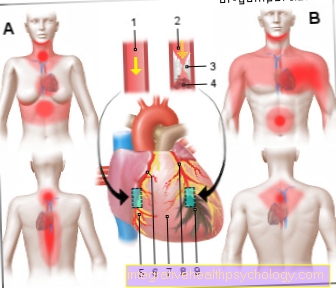














.jpg)





